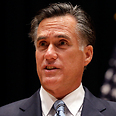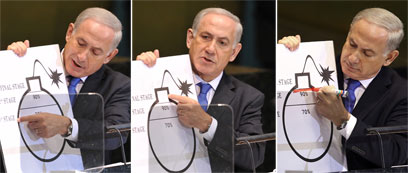

WASHINGTON – President Barack Obama and Prime Minister Benjamin Netanyahu on Friday expressed solidarity on the goal of preventing Iran from acquiring a nuclear weapon, the White House said on Friday, amid signs of easing tensions over their differences on how to confront Tehran.
Obama, who opted not to meet Netanyahu on his US visit, spoke by phone to the Israeli leader, who used his UN speech on Thursday to keep up pressure on Washington to set a "red line" for Tehran.
Related stories:
- PM: Message on Iran echoes worldwide
- US shares Israeli goal on Iran, stops short of 'red line'
- Netanyahu's cartoon bomb timed to make big impact
The two's phone conversation signified, to an extent, a sign of movement toward a truce in their war of words over how to confront Tehran.
But in a softening of his approach, Netanyahu also signaled that no Israeli attack on Iran was imminent before the November 6 US presidential election.
According to Washington sources, Obama's aides believe that he has played his cards right with Netanyahu, with whom the president has had a notoriously testy relationship.
Netanyahu's strident complaints about US policy on Iran in mid-September plunged US-Israeli relations into crisis, but also spurred a backlash at home and in the US media for seeming to meddle in American politics.
In recent days, the Israelis have sought to dial down the rhetoric, culminating in Netanyahu's speech to the UN General Assembly, which was widely seen as sending a message that Israel would not blindside Washington with a unilateral attack on Iran any time soon.
"The two leaders underscored that they are in full agreement on the shared goal of preventing Iran from obtaining a nuclear weapon," the White House said in a summary of their 20-minute phone conversation.

Netanyahu at the UN (Photos: Reuters, AFP)
But it stopped short of saying Obama had given any ground on his resistance to issuing an ultimatum to Tehran as Netanyahu has demanded.
"It was a good conversation. They discussed all the issues," said a senior Israeli official.
An Obama aide went further, saying, "The temperature is lower than it had been."
"I think we are moving in a direction where the differences that were there, which were always tactical and not strategic, are in fact being managed at this point," Dennis Ross, Obama's former Middle East adviser, told MSNBC.
Romney: Strike may be unnecessary
Meanwhile, Republican presidential nominee Mitt Romney said Friday that he does not believe military action will be necessary to prevent Iran from obtaining nuclear weapons.
The GOP hopeful said he discussed the issue with Netanyahu by telephone Friday afternoon, adding that it was unclear whether there is any difference between the US and Israel's so-called "red lines" on when launching military action against Iran would be appropriate.
Romney said could not "completely take the military option off the table" because Iran needs to take the threat seriously.
He added that he does not believe force will ultimately be needed.
"I do not believe in the final analysis we will have to use military action," Romney said. "I certainly hope we don't have to. I can't take that action off the table."
Netanyahu argues that an attack on Iran's nuclear facilities may be the only answer.
Reuters and AP contributed to this report
- Receive Ynetnews updates
directly to your desktop















